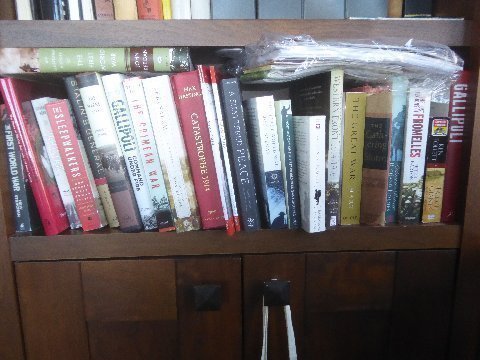Picto Diary - 30 October 2015 - Epilogue (2) Take Aways

Above: Bookshelf 'shay mwah" (sic) containing WWI related books.
I've spent over three weeks in 2015 on battlefield tours... Gallipoli, Belgium, and France. I've read quite a bit... completing Max Hastings, "Catastrophe," Edward Erickson's "Gallipoli," and Barbara Tuchman's "Guns of August," in addition to parts of other books, articles, Wikepedia etc.
I expect to continue my study of WWI, reading some of the pictured books, but, here are a few of my take aways from my WWI study to date:
Impact of limited knowledge until now. Until this year, I've lived a life only understanding WWI at the most superficial level. Filling in the WWI blanks gives context and texture to my understanding of the world situation today. How would my life/career have differed had I come by this information earlier? What good is the information today as my work life is behind me? How many of us go through life with only a limited understanding of the past... and, how, if at all, does that influence the quality of the lives we live? Answers to come?
WWI was... well.... a world war. Few places in the world were not directly impacted by WWI. China was a non participant. There were other neutral countries... Argentina, Ethiopia, Switzerland and others... but for those exceptions there few other inhabited parts of the world where there wasn't at least some fighting. There was no fighting in North America, but, of course Canada and the United States declared war against the Central Powers and sent troops to fight in Europe.
Desire for colonial expansion made war inevitable. One could say that WWI actually started in Africa. Seeing weakness in the Ottoman Empire, in 1909 the Italians declared suzerainty over Libya, an Ottoman possession, and the Ottoman's went to war with Italy. Young Turks Enver Pasha and Mustafa Kemal, "cut fighting teeth" in that conflict. Further, a resurgent Germany felt it had been cut off from its share of African colonial possessions. Germany forcefully protested France's subjugation of a Moroccan rebellion and subsequent occupation of that territory in 1911. Germany became ever more bellicose, ruled by an insecure Kaiser Wilhelm. After the Turks had lost control of the North African coast, the race was on to divide the spoils of the Ottoman Empire's Balkan possessions, culminating the Balkan Wars of 1912 and 1913. So, by the onset of the August Crisis in 1914, the world had already been at war for five years.
Bismarck smart. Kaiser dumb? Otto von Bismarck, Minister President of Prussia, was appointed in 1862 by Kaiser Wilhelm I. Bismarck, acting as de facto foreign minister united German states and won the Franco Prussian War in 1870. From 1870 to 1888 Bismarck worked for a peaceful Europe. On his father's death, Kaiser Wilhelm II sacked Bismarck. The insecure new Kaiser, with the backing of militaristic advisors, started a shipbuilding program and pushed more aggressively to add colonial possessions. War became "inevitable" as a pushy Germany began to destabilize the European status quo.
New technology increased the human cost of war. The advent of machine guns, more accurate and powerful artillery, air planes and tanks, rendered traditional infantry attacks to be far more costly in casualties than ever before. There were 11MM military and 7MM civilian deaths in WWI... casualty levels at unprecedented levels in world history.
Ottoman military conundrum. A strong reason for the British war council's decision to land troops at Gallipoli in April of 1915 was that the Ottoman army was weak. In 1914, the Ottomans had entered into two failed offensives... one against the Russians, led by young Turk, Enver Pasha, in the Caucasus and the other, led by young Turk, Djemal Pasha, against the British in Egypt, at the Suez canal. Mustafa Kemal, later Ataturk, participated in the misbegotten Suez invasion. Yet, the Ottoman military distinguished itself at Gallipoli holding the peninsula and the Dardanelles for the remainder of the war.
Trench warfare? While Entente and German troops faced off against one another across deeply entrenched positions along the Western Front, troops didn't always stay in the trench. Both sides launched significant efforts to breach their opponents trench lines. Among others, our group visited Neuve Chappele where the British launched an unsuccessful attack in 1915.... Loos, a failed late 1915 attack and Somme, where, in early 1916, the British and the French tried to breach German lines in 1916. Early in 1916, the Germans attacked allied lines at Verdun, an attack that almost succeeded but for the Germans having to withdraw several divisions to send to the Eastern Front to counter Russia's Brusilov Offensive in Galacia (Ukraine).
Addendum:

Above: Gallipoli. Command Under Fire. by Edward J. Erickson. I completed reading this book early October, 2015. I was able to read about the battles having been to the specific places where they occurred. Here is a summary of the book from the book's fly leaf:
Unique among World War I campaigns, the fighting at Gallipoli brought together a modern amphibious assault and multi-national combined operations. It took place on a landscape littered with classical and romantic sites - just across the Dardanelles from the ruins of Homer's Troy. The campaign became, perhaps, the greatest 'what if' of the war. The concept behind it was grand strategy of the highest order, had it been successful it might have led to conditions ending the war two years early on Allied terms. This could have avoided the bloodletting of 1916-18, saved Tsarist Russia from revolution and side stepped the disastrous Treaty of Versailles - in effect, altering the course of the entire 20th century.
This book is the first to focus on operational and campaign level decisions and actions, which drove the conduct of the campaign. It departs from emotive first-hand accounts and offers a broader perspective of the large scale military planning and maneuvering involved in this monstrous struggle on the shores of European Turkey